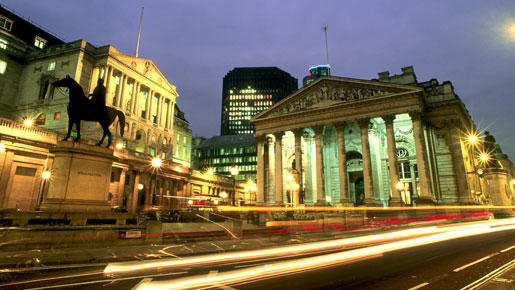
The Bank of England will get sweeping new powers to police London’s financial centre if Britain’s opposition Conservative Party wins the coming election, but changes to the structure may take about 18 months.
Analysts say that could increase short-term uncertainty – investors might think UK assets are that much riskier as a result. There is also concern that too much control will be concentrated in the hands of the central bank’s governor.
The Conservatives say Britain’s tripartite framework of supervision shared by the BoE, Treasury and FSA was found wanting during the credit crisis and their plans would ensure better coordination under one body.
There is also a totemic political significance. Prime Minister Gordon Brown created the arrangement in 1997 when just days after his Labour party took power, he gave the BoE the power to set interest rates – considered his masterstroke – but stripped it of its supervisory role and set up the FSA.
“Since we announced our plans, there has been growing international consensus on the need for central banks to have a pivotal role in the post-crisis architecture,” James Sassoon, author of the Conservative regulation blueprint, told reporters.
That seems to be beyond dispute. Policymakers around the world are scratching their heads trying to figure out how central banks can have better weapons against the kind of excessive risk-taking that many blame for the crisis.
The question for many analysts is whether the BoE is the body to have all the control. Brown created the FSA because of a perception the central bank was not up to the job as it had dropped the ball, most notably over the 1995 collapse of Barings, one of Britain’s most venerable banks.
More recently, Governor Mervyn King has been criticised for not having much interest in the City of London and making the BoE more of an academic monetary policy powerhouse.
King was also slow to respond when markets seized up in August 2007, seemingly more concerned about moral hazard if the central bank stepped into to unjam the freeze. The result was a run on Northern Rock bank, Britain’s first in a century.
“Do you want such a big BoE? I am sceptical,” said Philip Shaw, chief economist at Investec.
The Conservatives counter that talking about King’s role is just a personality issue. They are talking about structural changes that will last longer than people.
Labour says the planned reforms could actually prove damaging because of the uncertainty they create and the undermining of the work the FSA is doing.
“This is George Osborne thinking with his election coordinator hat rather than his shadow Chancellor hat,” said a Labour source.
No BOE moment
Even if the Conservatives win decisively in the election on May 6 – polls suggest no party will have an overall majority – talk of a dramatic shake-up like Brown enacted within a few days of Labour’s 1997 victory is far off the mark.
More likely, they would get the ball rolling on complex legislation, international agreements and finding the right people with a view to having things in place by the end of 2011.
Under the Conservative plans, the BoE will be in charge of so-called macro-prudential regulation – assessing risk not just from one firm but from the financial system as a whole.
This would undoubtedly involve so-called contracyclical levers on capital and liquidity – building up buffers in the good times by restricting dividends, share buybacks or pay.
George Osborne, almost certain to be finance minister if the Conservatives win, has ruled nothing out for now.
“The precise tools of macro-prudential regulation must now be the subject of intensive debate, international coordination, and ultimately experimentation,” he said in March.
“They may include variable risk weightings for different asset classes, adjustable capital and liquidity requirements, and even more direct interventions in lending behaviour.”
Analysts say such caution is understandable as international coordination will be key and global regulators are already working toward new capital rules by the end of the year.
But the interim period of power still with the FSA but eventually going to the BoE may leave people wondering who is in charge. There are also questions over what should be the BoE’s priority – its mandate now is to keep inflation at two percent.
“The dual mandate for financial regulation and inflation targeting, while likely to be beneficial in the long term, could result in uncertainty over the policy response function in the near-term and increase the risk premium priced into asset valuations,” said Mohit Kumar of Deutsche Bank.
Supervisory role
Under the plans, the BoE would take on the role of supervisor to institutions like banks and insurers which would involve the appointment of what some have termed a third deputy governor but is more likely to be styled something like chief executive for financial regulation.
The Conservatives say no decision has been taken on who this would be – though there has been speculation it could be a senior banker like Stephen Green of HSBC.
He or she would serve on a new Financial Policy Committee – working like the Monetary Policy Committee but having power over things like capital requirements rather than interest rates.
The chief executive would probably not sit on the MPC but the governor, be it King or his successor, and the existing deputy governor post, which oversees financial stability, would sit on both bodies, making sure both sides of the BoE were working together.

